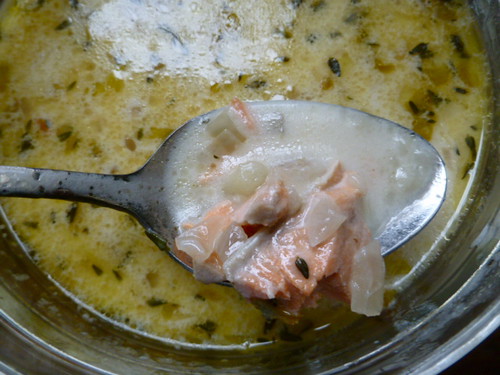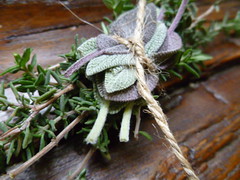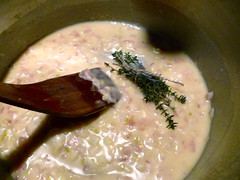
Another weekend in New York, another cook-off to attend! However, this one’s for a brand-spanking new cause. Held at Jimmy’s No. 43 this Saturday, from 1-4pm, pots of chowder will be steaming up the back room in a seafood-filled fest to raise better awareness of what’s in that soup. This cook-off will be a benefit for the Northwest Atlantic Marine Alliance (NAMA) and its continuing efforts to bring seafood into the sustainable food discussion. A $10 donation will get you in the door to taste all the chowders, and will go right to the non-profit organization.
Now, I’ve been to a great many cook-offs in this room, as host, contestant and judge, and it breaks my heart that I’ll be out of town during this one. But, in a wildly out-of-character burst of planning ahead, I’ve just finished making my chowder for it — to bring there beforehand. So as long as someone’s there to ladle it out for me, I’ll be there in spirit. You can check out my recipe for this salmon chowder (pictured above), made with my CSA-share wild-caught Alaskan sockeye salmon, just like the last cook-off dish. Yes, I’m giving my best stuff to you people. I think this chowder tastes pretty good, but I can’t wait to hear about what it’ll be up against. Please, do me proud and go to Jimmy’s to taste it yourself! I promise you won’t have a bad time.
 the little bundle of rooftop herbs that went into my simple salmon chowder
the little bundle of rooftop herbs that went into my simple salmon chowder
But, you may be wondering just what NAMA is and what it aims to do after this chowder day. I was curious about this myself. So, I got the opportunity to chat with two of its directors, Niaz Dorry (Coordinating Director) and Brett Tolley (Community Organizer), who recently returned from
Terra Madre, Slow Food’s international conference in Italy. I got to chat with them about what they think is most pressing about fishing today, and how their cause relates to the rest of our food system.
Me: The Terra Madre conference is all about building more sustainable food systems, but we typically think of those as being on land. How long has sustainable seafood been part of the discussion and why do you feel it belongs?
ND & BT: Including sustainable seafood and fisheries issues in the broader food system conversation is pretty new. In fact, we identified the missing link about three years ago when we were putting NAMA and our work through the paces of a strategic planning process. We realized then that the lens through which fisheries are viewed is flawed and too narrow. Simply put, if our rationale for killing marine animals is that we need them to feed the people, then why are we not looking at how we fish, where we fish, who fishes, where the seafood we catch ends up and who controls that market through the food system lens? We came to conclusion that not doing so gives the green light to fisheries managers and policy makers to make the mistake of evaluating the success of fisheries based on lowest cost of production which based on what have learned with our land based food system comes with dire environmental, social, economic and food system consequences.
Do you think that unsustainable fishing practices are going unnoticed all too often, or that the seafood industry as a whole has it easier in terms of regulation?
I do believe the definition of “unsustainable” is flawed in the context of fisheries management. Because what’s most valued in fisheries today is the lowest cost of production, the unsustainable industrial scale fisheries and aquaculture are going unnoticed. We are at the intersection that the farm movement found itself a few decades ago when agribusiness took over of land based food system by claiming they could provide cheap food to the world’s hungry. But as we know, we found like many decades later that the lowest cost of production is what we should jump to when all other values are equal – values such as community, ecology, economy and most recently food system. Today, aquabusiness is talking the same talk as agribusiness did. Fortunately, we have much to learn from the land based food system to make the necessary adjustments, but the regulatory process directing fisheries has yet to recognize the similarities between its world and the land based food system world. That’s why we believe our work is so important. We need to look at fisheries in the context of the food system to ensure we don’t repeat the same ecological, economic, social and food system mistakes that we are all working so hard to reverse with our land based food systems.

a splash of white wine blends in with a butter-and-flour roux
What was your goal at the Terra Madre conference?
To put the importance of who catches the seafood that end up on our plate squarely in the middle of the local, sustainable, safe, secure and sovereign food system. Just like family farmers, family fishermen are out marketed, out spent, out politicked by the agribusiness model that doesn’t recognize the ecological, community and economic values of small-scale fisheries. They don’t get a fair price for their catch, have to compete with the global seafood commodities market and have to “measure up” to the industrial fishing fleet when in fact the industrial fleet doesn’t even come close to embodying the ecological benefits of the community based fleet. Knowing all that we know, we want to make sure fishermen and our source of seafood aren’t left of the discussions as they have been so far. We have too much to lose – the health of our ocean being on top of the list – to allow our fisheries to go through what our small scale farmers and land based food system have had to go through the past 40+ years.
Who else joined you at Terra Madre this year?
All in all, 7 people from our Fish Locally Collaborative attended Terra Madre. This included representatives from Tufts University, Penobscot East Resource Center, By Land and By Sea Project, Maine Local Foods Coalition, and Maine Organic Farmers and Gardeners Association (and NAMA of course). Our roles varied from networking at food/fish/farm related workshops, to organizing and speaking on panels, to participating in small group discussions. In general our roles were to learn and to share. We participated in a Fisher People’s conference where fishers from all over the world shared their experiences. I was able to share my experience coming from a four-generation fishing family and facing many of the same struggles shared by small-scale fishers around the world. The organizer of Slow Food International’s new campaign called Slow Fish identified four fishers (including me) to form an ad hoc committee and create language for Slow Fishes original ‘manifesto’ or campaign document. The document will be posted onto Slow Fishes website soon as a working document which ultimately will serve to guide the Slow Fish campaign. Our group of delegates also organized a By Land and By Sea Forum where farmers and fishers from around the world identified common ground and creative strategies to collaborate.
How will this chowder cook-off benefit NAMA?
We are a small non-profit, and as most small organizations, we do a lot with a limited budget. The benefit will help offset the costs of the trip and related follow up work to Terra Madre. And, just as important it will help us spread the work that if we care about the future of our ocean, then who fishes for the food we get from it matters. It’s a matter of conservation and ecological sustainability and we need to make sure community based, family fishermen aren’t edged out by industrial scale, genetically modified, and agri-business type fisheries on the water.
Finally… what kind of chowder would you love to see on Saturday?
Hmmm… it’s tempting to feed the New York – Boston rivalry and say a good New England style chowder! But anything using local land and sea based food would work for me.
Um… I don’t want to go there! Too many bad memories of driving in Massachusetts with a New York license plate. But anyway, hope you enjoy my chowder. Now for the recipe!
Salmon Chowder
(makes about 1 gallon)
1 medium onion, diced
1 stalk celery, finely diced
2-3 medium red potatoes, diced
about 1 lb fresh wild-caught Alaskan sockeye salmon fillet, finely chopped
1 cup dry white wine
4 tablespoons butter
4 tablespoons flour
6-8 cups seafood stock
2-4 cups half-and-half
bouquet garni (fresh herbs such as sage, thyme, parsley and tarragon tied with kitchen string)
salt and pepper to taste
Melt the butter in a large pot and begin to cook the onion and celery over medium-low heat. Season with salt and pepper, and stir occasionally until onions are translucent, about 5 minutes. Add the flour and stir to evenly distribute. Add the wine and bring heat up to medium-high. Stir constantly until it’s thick, smooth and bubbly. Add the seafood stock and the bouquet garni. Add the potatoes. Bring to a boil, reduce heat to a simmer, and let cook for about 10-20 minutes, or until potatoes are tender. Add the salmon and the half-and-half and cook over medium heat until salmon is cooked through. Break salmon into smaller pieces by pressing against the sides of the pot with the back of your spatula a bit. Add salt and pepper to taste. Remove bouquet garni and serve.
 the little bundle of rooftop herbs that went into my simple salmon chowder
the little bundle of rooftop herbs that went into my simple salmon chowder


7 Responses
Katya
Oh that looks wonderful. I’d complain about missing it, if it wasn’t for the wedding of some dear friends.
Just finished reading your book — I think we’re neighbors…
Serena @ Seriously Soupy
Looks like a lovely chowder. Coincidentally this is a similar one that I was going to make – but I’m also out of town. Look forward to hearing about the cook-off!
pinky black
looking forward for the cook-off. this is just a lovely chowder. i love salmon, but not much of a chowder person. but since you incorporated salmon with chowder. i really have to try this one.
geek+nerd
That chowder looks so great! I wanted to check out Jimmy’s No. 43 the last time I was in the city, but I didn’t get to…so sad! Hopefully next time 🙂
Kimberley
I love love love salmon chowder. Thanks for the recipe!
Andrea
Salmon is my favorite food. I’ll have to try that chowder. Tarragon, wine and seafood is the perfect combination.